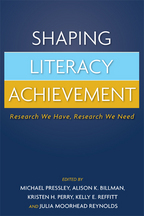Shaping Literacy Achievement
Research We Have, Research We Need
Edited by Michael Pressley, Alison K. Billman, Kristen H. Perry, Kelly E. Reffitt, and Julia Moorhead Reynolds
Paperbacke-bookprint + e-book
Paperback
orderMarch 9, 2007
ISBN 9781593854096
Price: $36.00 258 Pages
Size: 6" x 9"
“Definitely reader-and teacher-friendly....Pressley takes the reader into real classrooms and offers a fly-on-the-wall perspective of what is happening in both exceptional as well as typical classrooms. It is certainly an eye-opening, and ultimately encouraging, discussion. We strongly encourage you to get the book for yourself and spend some time reading and reflecting upon it. Highly recommended. A rock-solid and impressive work.”

—Education Oasis
“Shaping Literacy Achievement provides readers with a comprehensive discussion of the current state of literacy research, while also articulating directions for future work in the field. Pressley and his colleagues have created an invaluable resource for individuals who are developing or refining their own lines of literacy research. This is a 'must read' for graduate students, teacher educators, and researchers who want to understand and advance the current state of literacy education.”

—Erica C. Boling, PhD, Graduate School of Education, Rutgers, The State University of New Jersey
“This thoughtful analysis of past and future directions for literacy research will stir debate within the research community for some time to come. Pressley and his colleagues cover a range of issues, including research on adolescent literacy instruction, legislation and policymaking, and writing. The chapter on lessons learned since the National Reading Panel report alone is worth the price of the book! This book will appeal to educational leaders, policymakers, and literacy researchers. It should be considered for master's- and doctoral-level courses in literacy and educational leadership, and would fit well with a seminar in which the chapters could be discussed and juxtaposed with other viewpoints.”

—Bruce Taylor, PhD, Department of Reading and Elementary Education, University of North Carolina at Charlotte
“A 'must read.' Policy issues related to research trends and gaps are highlighted not only in the areas of early literacy and classroom instruction, but also in the areas of home literacy environments, adolescent literacy, writing instruction, and the integration of science and literacy. I would encourage all graduate students interested in literacy to read this book to get the creative research juices flowing!”

—Alysia D. Roehrig, PhD, Florida State University and the Florida Center for Reading Research
“From distinguished experts in the field of literacy development, each chapter synthesizes current findings and outlines a research agenda that will help us provide children with optimal learning environments. Because the existing research is described in such clear and descriptive language, this book is perfect for undergraduate and graduate courses in literacy development and instruction. Moreover, its focus on the gaps in existing research makes it a necessary tool for doctoral students and young faculty members. Pressley has done it again, providing the field with another clear, masterly synthesis of literacy research.”

—Margaret E. Pierce, EdD, School of Education, University of Massachusetts at Amherst
—Education Oasis
“Shaping Literacy Achievement provides readers with a comprehensive discussion of the current state of literacy research, while also articulating directions for future work in the field. Pressley and his colleagues have created an invaluable resource for individuals who are developing or refining their own lines of literacy research. This is a 'must read' for graduate students, teacher educators, and researchers who want to understand and advance the current state of literacy education.”
—Erica C. Boling, PhD, Graduate School of Education, Rutgers, The State University of New Jersey
“This thoughtful analysis of past and future directions for literacy research will stir debate within the research community for some time to come. Pressley and his colleagues cover a range of issues, including research on adolescent literacy instruction, legislation and policymaking, and writing. The chapter on lessons learned since the National Reading Panel report alone is worth the price of the book! This book will appeal to educational leaders, policymakers, and literacy researchers. It should be considered for master's- and doctoral-level courses in literacy and educational leadership, and would fit well with a seminar in which the chapters could be discussed and juxtaposed with other viewpoints.”
—Bruce Taylor, PhD, Department of Reading and Elementary Education, University of North Carolina at Charlotte
“A 'must read.' Policy issues related to research trends and gaps are highlighted not only in the areas of early literacy and classroom instruction, but also in the areas of home literacy environments, adolescent literacy, writing instruction, and the integration of science and literacy. I would encourage all graduate students interested in literacy to read this book to get the creative research juices flowing!”
—Alysia D. Roehrig, PhD, Florida State University and the Florida Center for Reading Research
“From distinguished experts in the field of literacy development, each chapter synthesizes current findings and outlines a research agenda that will help us provide children with optimal learning environments. Because the existing research is described in such clear and descriptive language, this book is perfect for undergraduate and graduate courses in literacy development and instruction. Moreover, its focus on the gaps in existing research makes it a necessary tool for doctoral students and young faculty members. Pressley has done it again, providing the field with another clear, masterly synthesis of literacy research.”
—Margaret E. Pierce, EdD, School of Education, University of Massachusetts at Amherst



